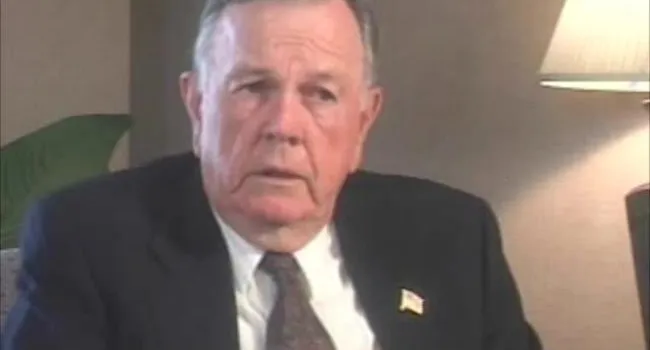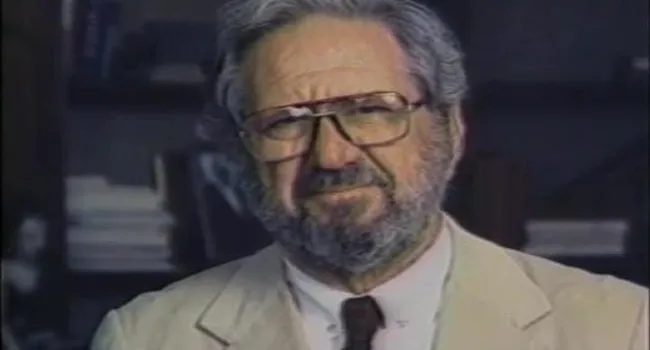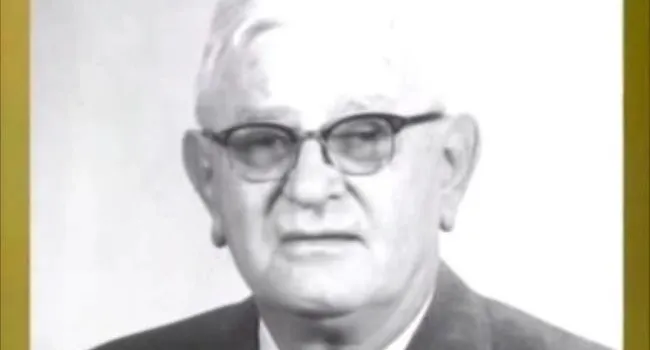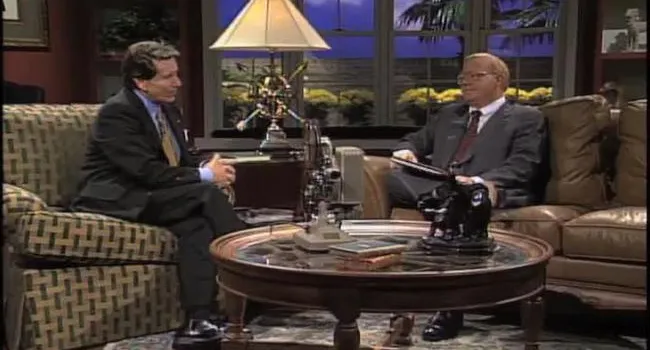Joe Williams never intended to get involved in the family-owned Williams Brothers pipeline construction business. He had other plans. Fate stepped in, however, and he spent 35 years with the multibillion-dollar company, the last 15 as chairman and chief executive officer. When he retired in 1994, the company was a much more focused, greatly expanded, and significantly more profitable enterprise than when he assumed the chairmanship in 1979.
He was reluctant to follow in the footsteps of his father, uncle, brother, and cousins. However, once he made a commitment to Williams, he left a greater legacy than expected by the cousin who tapped him for the top job years before Joe Williams realized he was being groomed potentially to be the company's next leader.
Joseph Hill Williams was born June 2, 1933, in Tulsa, Oklahoma, the youngest of four children of David Rogerson and Martha Hill Williams. He was much younger than his late brother, Dave Williams, Jr., and sisters, Martha W. Daniels and Kate W. Tabor.
While headquarters for Williams Brothers was Tulsa, Oklahoma, Mulberry Plantation in Camden became the family home in 1928, when Joe Williams' father acquired it from his uncle, and it was at Mulberry where Joe Williams grew up and developed many of the values that shaped his adult life.
Mulberry Plantation was the ancestral home of General James Chesnut and his wife, the Civil War diarist Mary Boykin Chesnut. The Williamses and the Chesnuts were united through marriage in the 1840s, and David R. Williams inherited Mulberry from his aunt, Mary Boykin Chesnut, upon her death in 1886. It has remained in the Williams family ever since.
The experience of growing up at Mulberry Plantation, a working farm embracing 5,000 acres, would shape Joe Williams' life. There he became a woodsman and naturalist, an environmentalist and conservationist, an avid fisherman, and an excellent wing-shot (quail, dove, duck). And he has spent many an hour alone in the woods in his quest for wild turkey.
The entire family was involved in equestrian activities, and Joe Williams was the youngest person ever to have "won the colors" of the Camden Hunt. His mother, an accomplished equestrienne who was master and co-master of the fox hounds for years, continued to ride during the first five months of her pregnancy with Joe. At his birth, he was awarded a plaque, a button from the hunting coat, and honorary membership in the Camden Hunt.
Joe Williams attended the Camden public school through the eighth grade and completed high school at St. Paul's School in Concord, New Hampshire.
He enrolled at Yale University and graduated in 1956 with a bachelor of arts degree in history and economics. As a student, he was a member of the Yale polo team for three years and was captain during his junior and senior years.
He married Penny Baldwin of Camden November 24, 1956, and they are the parents of three sons, Joseph H., Jr., Peter B., and James C. Williams. The marriage ended in 1974.
Joe Williams had been a member of the Army ROTC, and after graduating from Yale, he was sent to Fort Sill, Okla., to complete his training for a commission as an artillery officer.
However, he served during 1957 and 1958 as a platoon leader in a tank battalion with the 3rd Armored Division in Germany. Williams was stationed in Hanau, one of several locations of the 3d Armored "Spearhead" Division, whose role was to guard the Fulda Gap, an ancient invasion route into central Europe, against possible attacks by the Soviet Union.
While Williams was at Fort Sill, he visited his cousins at Williams headquarters in Tulsa. He was invited to "come see us" after he finished his Army duty. He deemed the invitation an expression of courtesy rather than a job offer. He was not interested in a career with Williams.
His father, in a much earlier conversation with his youngest son at Mulberry Plantation, had said to him, "What you ought to do is go to law school and come back here to Camden, look after the farm, and make sure it survives as a seat of family cohesion. It is quite an extraordinary place." Joe Williams had intended to follow his father's advice.
When he left the Army, Williams learned he would have to wait nine months to enter Harvard Law School, so he began making the rounds in New York City, looking for a job with smaller U.S. companies that operated overseas. He was repeatedly told he needed either experience or a graduate business degree, so he passed the exam for acceptance to Harvard's MBA program.
Word got back to Tulsa and John Williams that his young cousin was looking for a job in New York and with companies similar to Williams. He contacted Joe, expressed displeasure that he had not returned to Tulsa as he had been asked to do and further, that he planned to attend Harvard's business school. He sent Joe and his wife round-trip airline tickets to Tulsa and ultimately talked him into joining the firm.
The company he joined in 1959 was the second incarnation of Williams Brothers. The original founders, Dave Williams, his father, and S. Miller Williams, Jr., his uncle, retired in 1949 after 39 years of building pipelines, both domestically and abroad. They were arguably the best pipeline builders in the world.
They liquidated the company and sold the remaining assets to nephews and brothers, Charles P. Williams, Jr., and John H. Williams, and David R. Williams, Jr., Joe's brother, all of whom were Yale graduates already affiliated with the company.
The new owners retained the company name and many of the old employees. They initially struggled but eventually landed some lucrative contracts, prospered, and in 1957 took the company public. Ten years later, they were trading on the New York Stock Exchange under the symbol WMB.
Joe Williams joined the company in 1959. He began in the field as a timekeeper for the company's construction division in Kentucky, Tennessee, and Minnesota. From those jobs, he returned to Tulsa as a project coordinator of a major pipeline project in the engineering division.
The overseas assignment he eagerly sought came early in his career with Williams. He was sent to Iran as assistant superintendent in the far eastern corner of the country along the Russian/Afghan border. After numerous other project assignments, he became the company's project manager for the Trans-Iranian Pipeline Project, the largest project the company had in the Middle East. He spent his final three years of his seven-year tour of duty in Iran as the company's resident manager.
Iran was his favorite assignment, perhaps more so even than chairman and CEO. Says Williams, "It was a marvelous experience. I was 10,000 miles away from any Williams family member. I had to hunt my own rabbits, so to speak, be my own lawyer, engineer, and accountant. Yes, I could find local people to do that, but it was up to me to pull all of this together. There was no permanent staff. I learned more than I ever could have in any other circumstance. And if it didn't work, the buck stopped there." He continues, "Well, it turned into the most profitable operation we had in the company. I was pretty proud of that, and we were repeatedly getting new business."
Then his cousin, John, chairman and CEO, showed up in Iran. He wanted Joe back in Tulsa. The company's future was changing, away from pipeline construction to more diversity, including acquisitions of pipelines and many other unrelated types of businesses.
Initially, Joe Williams was not happy; however, he talked it over with his wife that night and the next morning agreed with John that his future was in Tulsa.
Williams returned to Tulsa in 1968 and later became executive vice president for Williams Brothers Co. He was elected a member of the board of directors in 1969, and in 1971, he was named president and chief operating officer. In 1979, he succeeded his cousin, John, as chairman and chief executive officer. He stepped down as CEO at the end of 1993 but continued as chairman until May of 1994, when Keith E. Bailey assumed both roles. Bailey was the first non-Williams family member to head the company.
When Williams retired net income in 1993 was a record $232 million. Net income was particularly low in 1978 ($12.8 million) the year before he took over; more typical would have been the previous year at $66.4 million. Assets while he was CEO more than doubled. At year-end 1993, assets totaled $5.3 billion, compared to $2 billion at year-end 1978. During his tenure, annual stockholder return averaged 13.2 percent.
Joe Williams concluded early in his tenure as CEO that a major strategic shift was required. He successfully undertook a massive transformation of the company, which required divesting most of the acquisitions accomplished by his predecessor and refocusing the company on its core competencies-pipelines, energy services, and related businesses. The new strategy and asset base set the stage for a prolonged period of profitable growth that continues today.
While Williams was chairman and CEO, two of his most significant achievements were the purchase of Northwest Energy Co. for $886 million, which helped double the size of the company, and initiating the development of an 11,000-mile fiber optics network, WilTel, much of which ran through decommissioned pipelines. On August 22, 1994, just three months after he retired as chairman, Wil was sold for $2.5 billion.
Williams is a member of the boards of directors of The Williams Companies, Inc., the Orvis Co., and AEA Investors, Inc. He recently stepped down from the boards of American Express Co. and the Prudential Insurance Co.
He is a former chairman of the board of governors of The Nature Conservancy; a founder, director, and former chairman of the Oklahoma Nature Conservancy; and a member of the board of trustees of the South Carolina Nature Conservancy.
He is a founder and chairman of the advisory council of the George Mikesch Sutton Avian Research Center in Oklahoma. The center promotes conservation, education, and research on endangered, rare, and neglected birds, among them our national symbol, the bald eagle.
Williams is also a board member of the Cornell Lab of Ornithology, a world-renowned non-profit institution whose mission is to interpret and conserve the earth's biological diversity through research, education, and citizen science, focused on birds and the protection of birds.
A member of the Business Council, he is a former fellow and trustee of the Yale Corporation and a former member of the Yale Institute for Biospheric Studies.He has received honorary degrees from Yale University, the University of Tulsa, and Phillips University.
Williams is a former chairman of the Federal Reserve Bank of Kansas City, the Metropolitan Tulsa Chamber of Commerce, and the Oklahoma State Chamber of Commerce and Industry. In 1988, he was inducted into the Oklahoma Hall of Fame.
In addition to hunting and fishing, he enjoys photography and golf, and is a member of Augusta National Golf Club, The Old Baldy Club in Wyoming, the Linville, N.C., Country Club, and Springdale Hall Club in Camden.
He and his wife, Terese Treman Williams, whom he married on May 7, 1977, reside on Spring Island in Beaufort County, S.C. and in Linville. He has two wonderful stepdaughters, Margot T. Rose and Jennifer B. Ross.
Williams was inducted into the South Carolina Business Hall of Fame in 2002.
© 2002 South Carolina Business Hall of Fame










